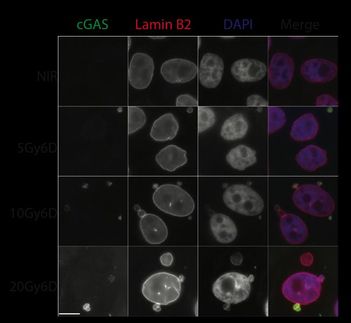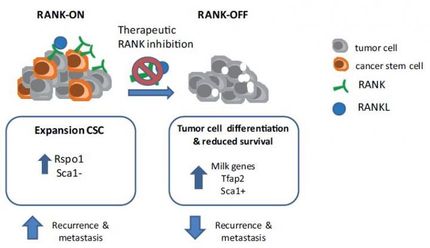Breast cancer treatment resistance linked to signaling pathway
Activation of the Src signaling pathway may cause resistance to standard medical treatment in some patients with breast cancer, and inhibition of this pathway holds the potential to overcome that resistance, according to data presented here at the American Association for Cancer Research molecular diagnostics in Cancer Therapeutic Development meeting.
"If this finding is confirmed in clinical trials, which are currently being designed, then inhibiting Src signaling while giving standard of care medical treatment might allow us to overcome some aspects of drug resistance in the clinic," said Christina M. Coughlin, M.D., Ph.D., medical director and global medical monitor at Wyeth Pharmaceuticals, who lead this research in Wyeth's Department of Discovery Translational Medicine.
The identification of genetically altered pathways in human tumors, and their subsequent inhibition, has become a major treatment strategy in many cancers. Herceptin, also known as trastuzumab, targeted HER2 in patients with breast cancer and was one of the first therapies to use this approach. Now, many newer cancer drugs have labeling to help oncologists identify patients based on expression of the drug target.
Some known pathways have no genetic events to help identify patients. Src is one of the oldest known oncogenes, active in many human cancers but with no known predisposing genetic event. Coughlin said researchers suspected that some part of its pathway, either downstream or upstream, may be driving tumor development and treatment resistance. Understanding which parts of the pathway to measure in human tumors is key to developing molecular diagnostics that could eventually allow oncologists to select appropriate patients for a Src inhibitor in the clinic.
For the current study, Coughlin and colleagues performed quantitative tissue microarray sampling among almost 650 patient samples to analyze for the expression of markers of the Src pathway.
According to Coughlin, the patients represented the entire spectrum of breast cancer, and researchers identified subsets of patients with high Src activation who expressed low levels of estrogen receptor, progesterone receptor and HER2, also known as triple negative breast cancer, as well as subsets expressing the estrogen or progesterone receptors.
These patient sets had lower overall survival associated with expression of Src signaling pathway biomarkers, which suggests that Src pathway activation may have played a role in treatment resistance.
"This gives us all the pieces to the puzzle. This type of cancer signaling pathway study holds the potential to help determine who the appropriate patients are for the newer targeted drugs that we have to treat breast cancer in the absence of genetic signals for a given drug target. We can then translate that information into molecular diagnostics that can be applied within the clinical trials," Coughlin said.
Other news from the department science

Get the life science industry in your inbox
By submitting this form you agree that LUMITOS AG will send you the newsletter(s) selected above by email. Your data will not be passed on to third parties. Your data will be stored and processed in accordance with our data protection regulations. LUMITOS may contact you by email for the purpose of advertising or market and opinion surveys. You can revoke your consent at any time without giving reasons to LUMITOS AG, Ernst-Augustin-Str. 2, 12489 Berlin, Germany or by e-mail at revoke@lumitos.com with effect for the future. In addition, each email contains a link to unsubscribe from the corresponding newsletter.



















































